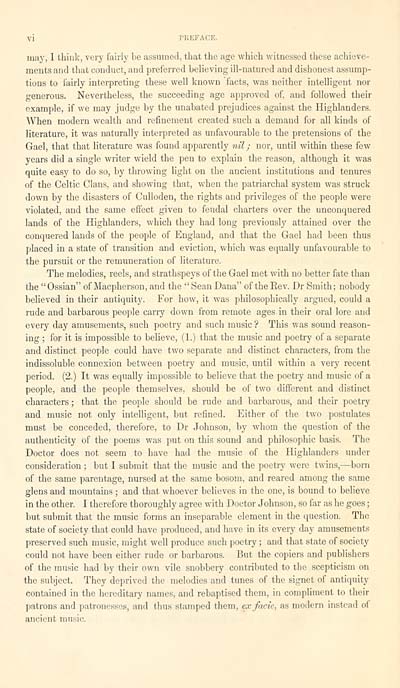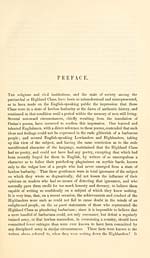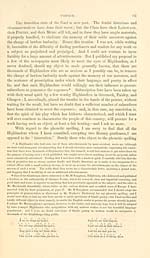Download files
Complete book:
Individual page:
Thumbnail gallery: Grid view | List view

may, I think, very fairly be assnined, that the age which witnessed these achieve-
ments and that conduct, and preferred believing ill-natured and dishonest assump-
tions to fairly interpreting these well known facts, was neither intelligent nor
generous. Nevertheless, the succeeding age approved of, and followed their
example, if we may judge by the unabated prejudices against the Highlanders.
When modern wealth and refinement created such a demand for all kinds of
literature, it was naturally interpreted as unfavourable to the pretensions of the
Gael, that that literature was found apparently nil ; nor, until within these few
years did a single writer wield the pen to explain the reason, although it was
quite easy to do so, by throwing light on the ancient institutions and tenures
of the Celtic Clans, and showing that, when the patriarchal system was struck
down by the disasters of Culloden, the rights and privileges of the people were
violated, and the same effect given to feudal charters over the unconquered
lands of the Highlanders, which they had long previously attained over the
conquered lands of the people of England, and that the Gael had been thus
placed in a state of transition and eviction, which was equally unfovourable to
the pursuit or the remuneration of literature.
The melodies, reels, and strathspeys of the Gael met with no better fate than
the "Ossian" of Macpherson, and the " Sean Dana" of the Rev. Dr Smith; nobody
beheved in their antiquity. For how, it was philosophically argued, could a
rude and barbarous people carry down from remote ages in their oral lore and
every day amusements, such poetry and such music ? This was sound reason-
ing ; for it is impossible to believe, (1.) that the music and poetry of a separate
and distinct people could have two separate and distinct characters, from the
indissoluble connexion between poetry and music, until within a very recent
period. (2.) It was equally impossible to believe that the poetry and music of a
people, and the people themselves, should be of two different and distinct
characters ; that the people should be rude and barbarous, and their poetry
and music not only intelligent, but refined. Either of the two postulates
must be conceded, therefore, to Dr Johnson, by whom the question of the
authenticity of the poems was put on this sound and philosophic basis. The
Doctor does not seem to have had the music of the Highlanders under
consideration ; but I submit that the music and the poetry were twins, — born
of the same parentage, nursed at the same bosom, and reared among the same
glens and mountains ; and that whoever believes in the one, is bound to believe
in the other. I therefore thoroughly agree with Doctor Johnson, so far as he goes ;
but submit that the music forms an inseparable element in the question. The
state of society that could have i)roduced, and have in its every day amusements
preserved such music, might well produce such poetry ; and that state of society
could not have been either rude or barbarous. But the copiers and publishers
of the music had by their own vile snobbery contributed to the scepticism on
the subject. They deprived the melodies and tunes of the signet of antiquity
contained in the hereditary names, and rebaptised them, in compliment to their
patrons and patronesses, and thus stamped them, ex facie, as modern instead oi
ancient music.
ments and that conduct, and preferred believing ill-natured and dishonest assump-
tions to fairly interpreting these well known facts, was neither intelligent nor
generous. Nevertheless, the succeeding age approved of, and followed their
example, if we may judge by the unabated prejudices against the Highlanders.
When modern wealth and refinement created such a demand for all kinds of
literature, it was naturally interpreted as unfavourable to the pretensions of the
Gael, that that literature was found apparently nil ; nor, until within these few
years did a single writer wield the pen to explain the reason, although it was
quite easy to do so, by throwing light on the ancient institutions and tenures
of the Celtic Clans, and showing that, when the patriarchal system was struck
down by the disasters of Culloden, the rights and privileges of the people were
violated, and the same effect given to feudal charters over the unconquered
lands of the Highlanders, which they had long previously attained over the
conquered lands of the people of England, and that the Gael had been thus
placed in a state of transition and eviction, which was equally unfovourable to
the pursuit or the remuneration of literature.
The melodies, reels, and strathspeys of the Gael met with no better fate than
the "Ossian" of Macpherson, and the " Sean Dana" of the Rev. Dr Smith; nobody
beheved in their antiquity. For how, it was philosophically argued, could a
rude and barbarous people carry down from remote ages in their oral lore and
every day amusements, such poetry and such music ? This was sound reason-
ing ; for it is impossible to believe, (1.) that the music and poetry of a separate
and distinct people could have two separate and distinct characters, from the
indissoluble connexion between poetry and music, until within a very recent
period. (2.) It was equally impossible to believe that the poetry and music of a
people, and the people themselves, should be of two different and distinct
characters ; that the people should be rude and barbarous, and their poetry
and music not only intelligent, but refined. Either of the two postulates
must be conceded, therefore, to Dr Johnson, by whom the question of the
authenticity of the poems was put on this sound and philosophic basis. The
Doctor does not seem to have had the music of the Highlanders under
consideration ; but I submit that the music and the poetry were twins, — born
of the same parentage, nursed at the same bosom, and reared among the same
glens and mountains ; and that whoever believes in the one, is bound to believe
in the other. I therefore thoroughly agree with Doctor Johnson, so far as he goes ;
but submit that the music forms an inseparable element in the question. The
state of society that could have i)roduced, and have in its every day amusements
preserved such music, might well produce such poetry ; and that state of society
could not have been either rude or barbarous. But the copiers and publishers
of the music had by their own vile snobbery contributed to the scepticism on
the subject. They deprived the melodies and tunes of the signet of antiquity
contained in the hereditary names, and rebaptised them, in compliment to their
patrons and patronesses, and thus stamped them, ex facie, as modern instead oi
ancient music.
Set display mode to: Large image | Transcription
Images and transcriptions on this page, including medium image downloads, may be used under the Creative Commons Attribution 4.0 International Licence unless otherwise stated. ![]()
| Early Gaelic Book Collections > Blair Collection > Treatise on the language, poetry, and music of the Highland clans > (10) |
|---|
| Permanent URL | https://digital.nls.uk/76236513 |
|---|
| Description | A selection of books from a collection of more than 500 titles, mostly on religious and literary topics. Also includes some material dealing with other Celtic languages and societies. Collection created towards the end of the 19th century by Lady Evelyn Stewart Murray. |
|---|
| Description | Selected items from five 'Special and Named Printed Collections'. Includes books in Gaelic and other Celtic languages, works about the Gaels, their languages, literature, culture and history. |
|---|

